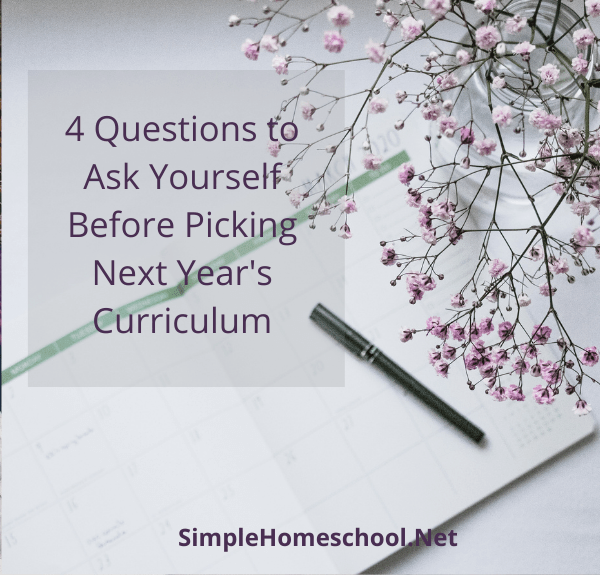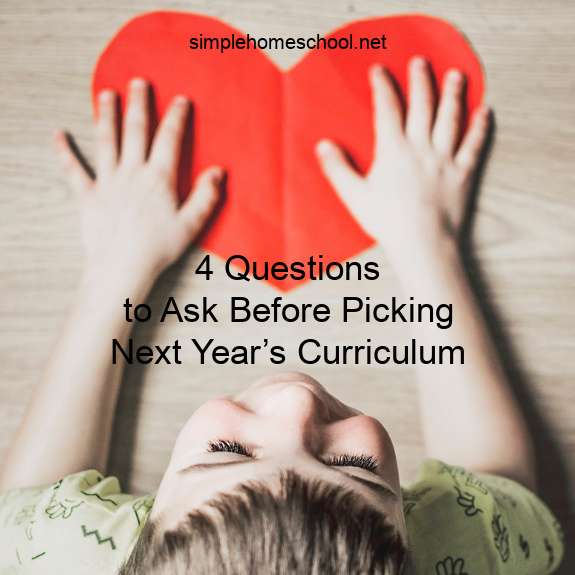4 Questions to Ask Yourself Before Picking Next Year’s Curriculum ~
Written by Purva Brown of The Classical Unschooler
It is officially that time of the year when it is more fun to be picking next year’s curriculum than finishing the last of this year’s workbooks. Spring is in the air. Everything is in bloom.
I don’t know about you, but this is the time I want to run out and buy new things – new clothes, new bedding, and yes, new books.
But wait.
Prefer to listen instead?
Besides the fact that most years, our school year starts in January and we homeschool year round, I have to remind myself not to rush into new curricula just for that new book smell. There are a few things to review before this big decision.
These are the questions to ask yourself before committing to something.
This is especially true if you’re thinking about delving into something new or thinking of changing up your style of homeschooling and especially so if you’re thinking about writing your own curriculum. (afflink)
4 Questions to Ask Yourself Before Picking Next Year’s Curriculum
1. What are the personalities we are dealing with?
I’m a huge fan of homeschooling organically. Organic schooling means that the sit down work we do is not necessarily something imposed onto the children or on me for that matter. We do not undertake something just because “everyone is doing it.”
I don’t pick curricula based on something that children at a specific age are doing in public school. Instead, I like to pick something that works with the children’s personality and mine.
For example, our family would never do well with lots of desk work. So I don’t pick a curriculum that requires a ton of it. I also don’t like to follow instructions to a T, so unless I’m baking a cake, I take most instructions as suggestions.
You can probably tell the worst thing I would do at this point would be to buy a box curriculum with explicit instructions for me. It would never work! So I respect my eclecticism and leave room for it.
2. What are my children’s eccentricities and how can they be beneficial?
As an extension of the above, but just as an exercise in paying attention and committing to a wholly organic curriculum, I also like to include the child’s individual eccentricities into our homeschool.
For example, my middle son loves to research and read. When he gets a hold of a screen, he seems to approach it with the dogged desire to find something out. He loves nothing better, even approaching video games that way. And he likes to “teach” his younger siblings. So I tend to approach his education from a base of research and investigation.
My youngest child is taking forever to learn double digit multiplication, but he likes to cook and has no problems understanding fractions. So we’re bending the rules and teaching those right along with multiplication. Everyone has quirks; the trick is to use them well.
3. How was last year?
It was an anomaly of a year, but it was a first year of homeschool for a lot of people. So ask this question. How did homeschooling go? Was it hard or easy? What worked and what didn’t?
Take this time to note everything that could be changed or customized to fit your family. If there was something you wish you had done differently, this is the time to note that.
2020 for us personally has been the year with the biggest changes. For obvious reasons, it was difficult, but it was also the year that our children made the greatest leaps in growth and independence. As such, our homeschool reflects that and has changed a lot this year as well.
If I tried to continue what we have been doing for the last eight years, it just wouldn’t work. The older children have shifted to a more independent way of learning and as a a result I have more free time to myself.
The youngest is benefiting from everything I learned while teaching the older and as a result is also enjoying more of what he likes to do without me panicking that he isn’t doing enough sit down work. Take the time to review the year before and incorporate the lessons learned.
4. What are the non-negotiables?
There are some things that I need to see my kids do for me to consider them educated. My husband and I are crystal clear on the matter. Many families have an idea of what their own non-negotiables are. It’s a good idea to have a discussion about this beforehand, first between the parents and then with the children themselves.
Our family’s non-negotiables include math, reading, writing, learning about handling money and every chore that keeps our home running smoothly. As such, we include that in our homeschool and the children know that we expect them to master these.
We work with them on these, but they’re never off the table completely.
By asking these four questions each year, I ensure I am choosing wisely before committing to new materials.
I make sure that I am investing in tools that serve our unique family, instead of tools that require us to change who we are to serve them. Doing so contributes to a happier homeschool and helps me be a happier homeschool mom, too!
Tell us in the comments- what do you ask yourself before picking next year’s curriculum?
What’s Your Homeschool Mom Personality? Take Jamie’s quiz now and receive a free personality report to help you organize your homeschool based on what your personality type needs most!




 Weekend homeschool links: April 2nd
Weekend homeschool links: April 2nd